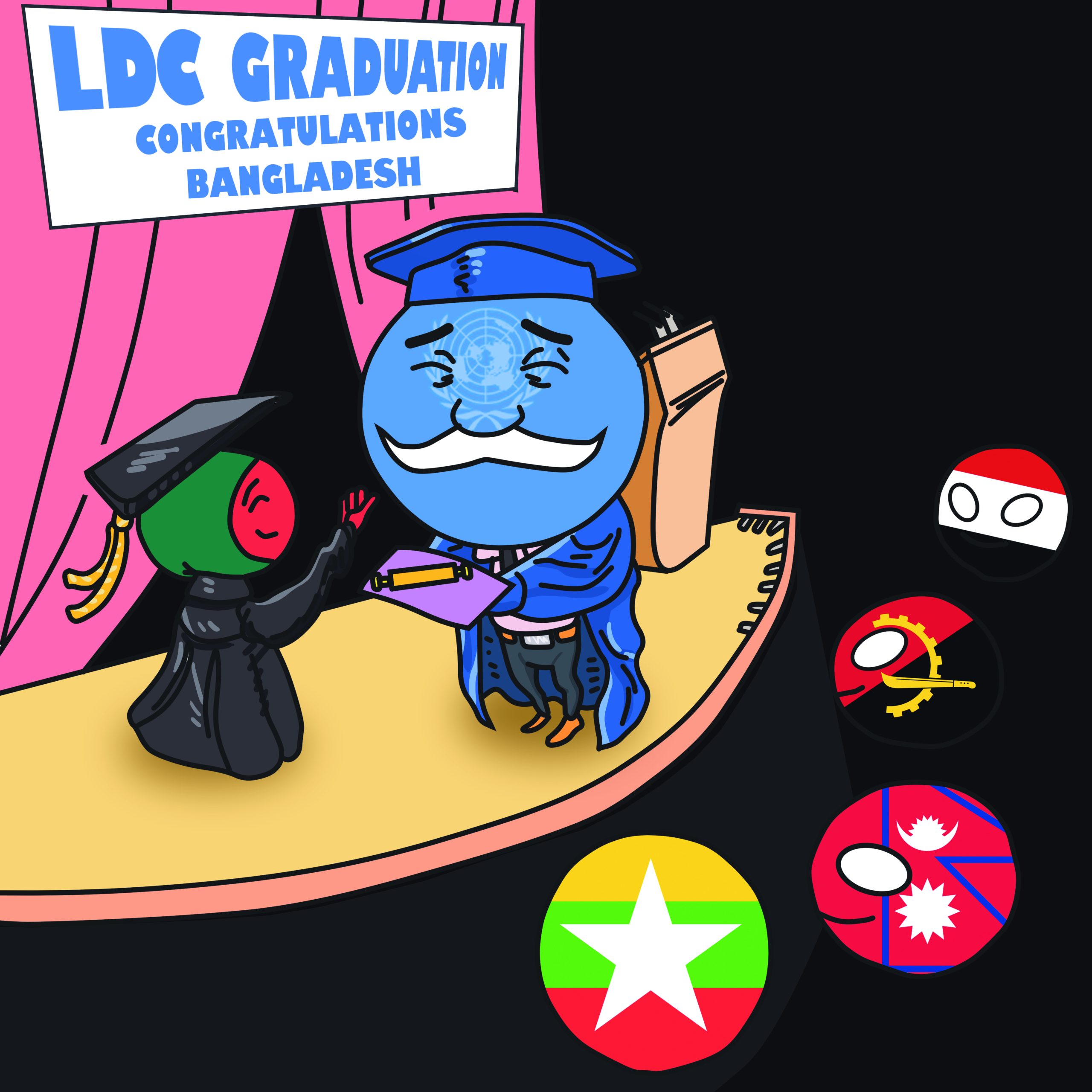Since 2021, when Bangladesh was recommended for graduation from a least developed country (LDC) status, many have celebrated the news and rightly so. Bangladesh is on course to eventual graduation from LDC status in 2026. However, some quarters particularly some business leaders and policymakers, have expressed trepidation about the loss of some special ‘benefits’ or waivers which Bangladesh would lose out in a post-LDC graduation era. However, this write-up argues that actually, there is not much to lament about the so-called loss of waivers or special benefits that Bangladesh has enjoyed as an LDC. Indeed, despite the current economic trouble that we are going through, we should not forget that while an LDC must meet two of the three thresholds for graduation, Bangladesh has been able to meet all three criteria used, which is an indication of the overall socioeconomic progress in the last couple of years. The LDC graduation should be viewed as a testament to the discernible socioeconomic progress since 1975 when Bangladesh was first designated as an LDC country.
Being branded as an LDC by the United Nations Conference on Trade and Development (UNCTAD) hardly offers enough. Few do care about economically weaker states. Poverty hardly begets anything but neglect or, at best, pity from others. It is somewhat innate in human nature that most may pity the poor or offer them some modest help. But barring a few great souls, few would really care much, let alone respect the poor. It was quite undignified for Bangladeshis when many of our national economic policies were deliberated and decided not in Dhaka but at the Paris Aid Group Summit. While Bangladesh still relies on foreign loans, graduation from the LDC status is a recognition of the Bangladeshi economy’s progress, however modest and volatile it may be. And that may gradually augment Bangladesh’s image in various international forums.
The special and differential treatment that developing countries and LDCs enjoy contains few meaningful rights. The GSP benefit, which is a point of concern in a post-LDC graduation era, has hardly been as effective as many perceive. Far too often, GSP granting states have devised and used their GSP for their own economic or strategic advantage, if not directly, then indirectly. And which countries enjoy the GSP benefit, under what conditions, to what extent and for which products – have all been dependent on the subjective satisfaction of the GSP granting countries. In EC – Tariff Preferences, India challenged the discriminatory aspect of the European Union (EU) GSP regime under the so-called Drug Arrangements. India alleged that by discriminating between developing countries, the EU violated Article I of the GATT. The Panel, in essence, upheld the Indian claim. However, on appeal, the Appellate Body (AB) reversed the Panel’s finding on this point. The AB held that the same development need might not be present for all benefit receiving countries and thus, in essence, it endorsed the right of the GSP granting countries to discriminate in terms of tariff treatment between similarly situated beneficiary countries.
It is also common knowledge that some of the Generalized System of Preference (GSP) granting states have tied their scheme with conditions which were quite difficult for Bangladesh to comply with. The USA dropped Bangladesh from its list of GSP beneficiaries on rather flimsy grounds. The diplomatic efforts of Bangladesh to restore it went in vain. Not just the taking away of the GSP benefit but the threat of doing so has created undue concerns for Bangladeshi businesses and policymakers.
Of course, as Bangladesh formally graduates from the LDC status, there may be pressure from many of our largest trading partners to rationalise our import tariffs for many products. However, the reliance on high import tariffs cannot sustain forever. While the import tariff may appear to be a burden for Bangladeshi importers, ultimately, they are passed on to and borne by our consumers. Loss of import tariff can be offset somewhat by increasing our domestic tax base. Of course, there is a genuine threat of losing access to concessional loans, we must not forget the strings that are often attached to concessional loans.
By nature, Bangladeshi people, as well as its entrepreneurs, have been resilient. When getting going was tough, they made the tough going for them. Many experts raised doubt about the ability of the Bangladeshi garment industry to sustain itself in an open global market in the post-Multi Fiber Arrangement era. But the garment industry of Bangladesh has thrived, proving the sceptics wrong. Undeniably, for some industries like the pharmaceuticals, graduation from the LDC status would pose at least short-term challenges. However, instead of lamenting the loss of special waivers, they need to explore avenues for making their industry sustainable in a more competitive market.
While there are challenges to some of our industries, there would also be opportunities. It is possible that when Bangladesh progresses to the developing country status, foreign investors will think more positively about investing in Bangladesh and the flow of foreign direct investment may increase. Graduation from LDC may also offer an opportunity to brand Bangladesh beyond a poor, natural disaster-prone country to an emerging economy with promise.










